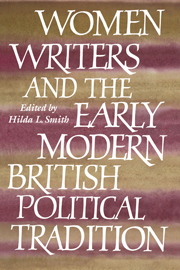Book contents
- Frontmatter
- Contents
- List of contributors
- Preface
- Introduction: Women, intellect, and politics: their intersection in seventeenth-century England
- Part I Women's political writings, 1400–1690
- Introduction to Part I
- 1 Christine de Pizan and the origins of peace theory
- 2 Political thought/political action: Margaret Cavendish's Hobbesian dilemma
- 3 Women's public political voice in England: 1640–1740
- 4 Contextualizing Aphra Behn: plays, politics, and party, 1679–1689
- Part II Women's political and philosophical writings, 1690–1800
- Part III The intellectual context and economic setting for early modern women
- Part IV Early modern legal and political prescriptions for women
- Conclusion: women's writing, women's standing: theory and politics in the early modern period
- Index
1 - Christine de Pizan and the origins of peace theory
from Part I - Women's political writings, 1400–1690
Published online by Cambridge University Press: 04 August 2010
- Frontmatter
- Contents
- List of contributors
- Preface
- Introduction: Women, intellect, and politics: their intersection in seventeenth-century England
- Part I Women's political writings, 1400–1690
- Introduction to Part I
- 1 Christine de Pizan and the origins of peace theory
- 2 Political thought/political action: Margaret Cavendish's Hobbesian dilemma
- 3 Women's public political voice in England: 1640–1740
- 4 Contextualizing Aphra Behn: plays, politics, and party, 1679–1689
- Part II Women's political and philosophical writings, 1690–1800
- Part III The intellectual context and economic setting for early modern women
- Part IV Early modern legal and political prescriptions for women
- Conclusion: women's writing, women's standing: theory and politics in the early modern period
- Index
Summary
Nature willed that from my studies and experience there be born new works, and commanded: “Take up your tools and hammer out on the anvil the material I shall give you, as lasting as iron and impervious to fire and everything else, and forge objects of delight. When your children were in your womb, you experienced great pain bringing them into the world. Now it is my wish that new works be born from your memory in joy and delight, which will carry your name forever all over the world, and to future generations of princes.”
Christine de Pizan, Lavision-Christine, 1406Dans le monde immatériel de la pensée, rien ne meurt; la germination est continuelle.
Ernest Nys, Etudes de droit internacionale, 1896“To discover by oneself some new and unknown thing”
Like much in Christine de Pizan's writings, the passage above is rich in complex images and meanings, forging links between nature and learning, work and childbirth, body and mind, the pain of labor and the joy and delight of creation. Significantly, Christine attributed her intellectual creations to “Nature” rather than “God” and portrayed them as “objects of delight” rather than moral strictures. But the works Christine left us included major contributions in both moral philosophy and political theory.
Christine de Pizan is called “France's first woman of letters,” “the first feminist,” and similar titles of precedence.
- Type
- Chapter
- Information
- Publisher: Cambridge University PressPrint publication year: 1998
- 1
- Cited by



